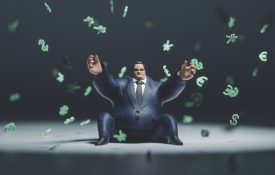-
Think Fast to Stay ‘Up’
You wake up. Your phone blinks. You touch the screen, slide your finger, and chills shiver down your spine. “See me tomorrow,” says the email your boss sent at midnight. Your thoughts accelerate. “What does she want? Why did she write so late? Am I in trouble? The company is in trouble. This down economy! I’m getting fired. Why me? Where will I work? I have skills. There are other companies. I have no skills. Where will I apply? Can we move? How will the kids react to changing schools? I can do this. We can do this. No matter what.” We think. It helps us. Errands, plans, and goals require thought. Synapses fire. Action potentials race down axons.
-
Your Choice of Friends Can Help You Improve Your Focus
Having trouble disciplining yourself to hit the gym rather than joining colleagues for happy hour? Unable to stop chatting with your friend in the next cubicle even though a deadline is looming? Many of us struggle to resist temptations—even fighting to keep from checking Facebook when we’re trying to finish a report to the boss. The remedy may be developing close working relationships with people who exhibit a high degree of self-discipline, according to a recent study.
-
What to Remember Before a Job Interview
It’s easy to feel nervous and awkward when applying for a new job. Unless you’re already working and a potential employer is trying to poach you, you’re essentially at the mercy of a recruiter looking at your résumé and talking with you about your qualifications. That can instill a profound sense of vulnerability. But new research has identified a possible strategy that can help job candidates improve their confidence and communication skills during the interview process. An international team of scientists recently found that you can more effectively impress recruiters by merely recalling a time when you felt powerful.
-

Cheatin’ Hearts
Free market principles that serve as the cornerstone of many western economies may serve as a sturdy foundation for fraud and deception, a psychological study show.
-
The Perils of Being the Decider
Making business judgments, like forecasting the weather, always entails an element of uncertainty. Sound decision-making about when to spend capital – or, analogously, when to prepare for an incoming storm – requires assessing the degree of uncertainty and gauging whether the benefits outweigh the risks. Susan Joslyn, researcher at the University of Washington, studies how we make decisions when outcomes are unclear. In a recent article in Current Directions in Psychological Science, a journal of the Association for Psychological Science, Joslyn and co-author Jared LeClerc examine which factors lead to better (or worse) decision-making in uncertain situations.
-
The Opt-Out Option
Getting employees to sign up for the company health plan, the 401(k), and other benefits can often be as daunting as getting a cat to fetch a stick. Researchers have learned that options and services too often falter because they’re designed to depend on people taking some kind of action. Studies show that relying on inaction yields better results. Some experiments with organ donation serve as a model. In the United States, 85 percent of Americans say they approve of organ donation, but only 28 percent give their consent to be donors by signing a donor card. The difference means that far more Americans die awaiting transplants. But psychologists Eric J.

